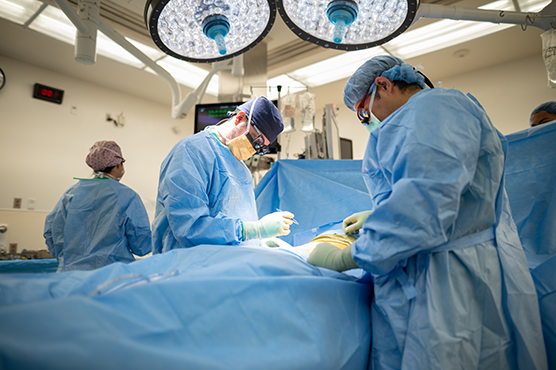Transplants
Learn about organ transplantation, in which we give you a new organ to replace your sick or damaged one. Our compassionate experts guide you through each step of the process.
Medically reviewed on Nov. 07, 2023.

Innovative Care for Organ Transplants
The UC Davis Transplant Center provides heart, kidney and liver transplants. We offer cutting-edge treatments for transplant donors and recipients.
Our transplant team includes surgeons, nephrologists (kidney specialists), hepatologists (liver specialists), cardiologists (heart specialists), gastroenterologists (digestive system specialists), and nurses. Our team also includes anesthesiologists, advanced practitioners, transplant coordinators, financial coordinators, social workers, dietitians, pharmacists, and transplant administrators. Together, they ensure you receive the highest level of care.
Our Difference
Leaders in Transplant Innovation
The UC Davis Transplant Center performed the first fully robotic donor nephrectomy (kidney removal from a living donor) in the Sacramento region. The center was also one of the first to offer a minimally invasive donor nephrectomy. Our innovations lead to better patient outcomes.
Team-Based Care
Donors and recipients receive expert care from a team of highly trained transplant specialists. We monitor every aspect of your care, from the first evaluation to outpatient follow-up.
Transplantation Expertise
We have been at the forefront of transplantation surgery and care for three decades. Our kidney transplant program is one of the busiest in the nation.
What Is Transplantation?
Transplantation involves removing a damaged organ from your body and replacing it with a healthy one. Your new organ comes from a donor. The donor may be a living relative, a living non-relative, or a non-living person.
The organ transplant process includes:
1. Evaluation
The first step in the process is an evaluation. Your transplant team will give you a full medical exam and discuss your medical history. They will determine whether you can benefit from transplant surgery.
2. HLA Typing
HLA typing is a test that identifies antigens (proteins) in your blood. Antigens tell your body to attack foreign invaders like viruses or bacteria. They can also tell your body to attack (reject) a new organ. HLA typing helps us match you to a donated organ that your body is less likely to reject.
3. Transplant Waiting List
After you qualify for transplant surgery, your transplant team will add you to a local and national waiting list. Waiting periods can vary, but we will be here to support your health the whole time. When you match with a compatible donor organ, your transplant team will schedule your surgery.
4. Surgery and Hospital Stay
Your exact procedure and hospital stay will depend on the type of transplant you have. You will learn about the medications you need to prevent your body from rejecting your new organ. You will also learn how to watch for symptoms of rejection.
5. Follow-Up Care
Your transplant team will monitor your recovery. You will see your transplant specialist for weekly follow-up appointments. You will need lab tests to check for organ rejection and infection. If any problems come up, our transplant team will be ready to handle them.
Causes
When an organ stops working, you may need transplant surgery to improve your quality of life. There are different reasons why organs fail.
Top causes include:
Birth Anomalies
You may be born with a condition that prevents your organ from developing normally. This can cause organ failure at birth or later in life.
Injury
Infections or trauma can cause severe injury to an organ. Sometimes, organs don’t recover from the injury and begin to fail.
Medical Condition
Conditions like coronary artery disease (CAD), diabetes and polycystic kidney disease (PKD) are known to cause organ damage and failure.
Request an Appointment
As Sacramento's No. 1 hospital, you'll benefit from unique advantages in primary care and specialty care. This includes prevention, diagnosis and treatment options from experts in 150 specialties.
Referring Physicians
To refer a patient, submit an electronic referral form or call.
800-4-UCDAVIS
Patients
Call to make an appointment.
Consumer Resource Center
800-2-UCDAVIS

Ranked among the nation’s best hospitals
A U.S. News & World Report best hospital in cardiology, heart & vascular surgery, diabetes & endocrinology, ENT, geriatrics, neurology & neurosurgery, and pulmonology & lung surgery.

Ranked among the nation’s best children’s hospitals
U.S. News & World Report ranked UC Davis Children’s Hospital among the best in pediatric nephrology, orthopedics*, and pulmonology & lung surgery. (*Together with Shriners Children’s Northern California)

Ranked Sacramento’s #1 hospital
Ranked Sacramento’s #1 hospital by U.S. News, and high-performing in aortic valve surgery, back surgery (spinal fusion), COPD, colon cancer surgery, diabetes, gynecological cancer surgery, heart arrhythmia, heart failure, kidney failure, leukemia, lymphoma & myeloma, lung cancer surgery, pacemaker implantation, pneumonia, prostate cancer surgery, stroke, TAVR, cancer, orthopedics, gastroenterology & GI surgery, and urology.

The nation’s highest nursing honor
UC Davis Medical Center has received Magnet® recognition, the nation’s highest honor for nursing excellence.

World-class cancer care
One of ~59 U.S. cancer centers designated “comprehensive” by the National Cancer Institute.

A leader in health care equality
For the 13th consecutive year, UC Davis Medical Center has been recognized as an LGBTQ+ Healthcare Equality Leader by the educational arm of America’s largest civil rights organization.

